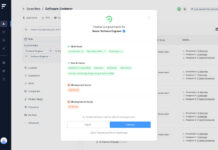
Pymetrics, which combines neuroscience and AI to identify the traits that contribute to success in a role and applies them to incoming job applications, closed a $40 million Series B funding round.
 Led by General Atlantic, the round also includes new investors Salesforce Ventures and Workday Ventures, plus existing investors Khosla Ventures and Jazz Venture Partners.
Led by General Atlantic, the round also includes new investors Salesforce Ventures and Workday Ventures, plus existing investors Khosla Ventures and Jazz Venture Partners.
Founded in 2012 by two MIT graduates—neuroscientist Frida Polli and data scientist Julie Yoo—Pymetrics uses neuroscience-based games (“talent assessments,” as some observers prefer to call them) to determine the traits of a role’s optimum performers. It then uses its analytics to uncover candidates who match them.
The company said the funding round is one of the largest for a female-led startup based in New York during the last 12 months, according to an analysis of Crunchbase data. “The average deal size for a woman-led company in 2017 was just over $5 million, according to a report by Fortune, making Pymetrics’ $40 million round and its total funding of $58 million to-date a standout among its peers,” it said in a press release.
This year, Pymetrics open-sourced its algorithm bias-detection tool, Audit-AI, to help technology creators detect bias in their solutions. It also launched an Asia-Pacific presence by opening offices in Singapore and Sydney, adding to the company’s locations in New York and London.
Pymetrics plans to invest in continued international expansion and product development.
In Pymetrics’ view, many failed hires could be avoided if inefficiencies and biases were removed early in the process Polli told us in an interview last year. At the time, she said, the average job attracted about 250 resumes and recruiters spent six seconds giving each one an initial scan.
Besides being inefficient, she said, it allows each reviewer’s biases to influence their decision-making, which results in 30 to 50 percent of new hires failing.
“We think you can have the best impact by making sure recruiters see the candidates who are best-aligned with their company’s profiles of success,” Polli said. “Remember, we don’t look at resumes—we look at the traits that contribute to success in different functions at each company.” Pymetrics’ approach, she believes, “ends up being more predictive than a regular resume review.”
Image: Natthapong Khromkrathok















